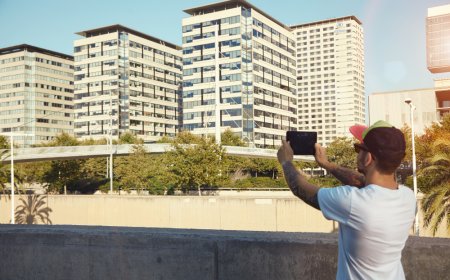How to Attend Live Book Readings in Phoenix
How to Attend Live Book Readings in Phoenix Phoenix, Arizona, may be known for its desert landscapes and sweltering summers, but beneath the heat lies a vibrant, growing literary culture that thrives in independent bookstores, libraries, art centers, and intimate cafes. Live book readings are more than just authors reciting their work—they are communal experiences where stories come alive through
How to Attend Live Book Readings in Phoenix
Phoenix, Arizona, may be known for its desert landscapes and sweltering summers, but beneath the heat lies a vibrant, growing literary culture that thrives in independent bookstores, libraries, art centers, and intimate cafes. Live book readings are more than just authors reciting their work—they are communal experiences where stories come alive through voice, emotion, and connection. Whether you’re a lifelong reader, a budding writer, or simply someone seeking meaningful cultural engagement, attending live book readings in Phoenix offers a unique opportunity to deepen your relationship with literature and community.
Unlike virtual events, live readings create an immersive atmosphere where you can feel the rhythm of a poet’s cadence, witness an author’s hesitation before a pivotal line, or share silent nods with strangers who understand the weight of a well-placed metaphor. These events often spark conversations that extend beyond the stage—into book clubs, social media threads, and lifelong friendships.
This guide will walk you through everything you need to know to attend, enjoy, and even thrive at live book readings in Phoenix. From finding events to navigating venues, preparing your mindset, and engaging respectfully with authors and fellow attendees, this is your comprehensive, step-by-step resource to becoming a seasoned participant in Phoenix’s literary scene.
Step-by-Step Guide
Step 1: Identify Where Book Readings Occur
Phoenix hosts literary events across a wide range of venues, each offering a different vibe and audience. Start by mapping out the most consistent and reputable locations:
- Independent Bookstores: Changing Hands Bookstore (with locations in Phoenix and Tempe) is the epicenter of Phoenix’s literary community. They host weekly readings, often featuring regional and national authors.
- Public Libraries: The Phoenix Public Library system, especially the central library on Washington Street and branches like the Maryvale and Arcadia locations, regularly schedules author talks, poetry slams, and writing workshops.
- Cultural Centers: The Phoenix Art Museum, the Arizona Historical Society, and the Heard Museum occasionally host literary events tied to exhibitions or indigenous storytelling traditions.
- Cafés and Bars: Places like The Bookshelf Café, Caffe Trastevere, and The Van Buren’s smaller lounge spaces offer cozy, informal settings ideal for emerging writers and spoken word artists.
- Universities: Arizona State University’s Tempe campus and the University of Phoenix frequently open their events to the public, especially through their creative writing departments and literary journals.
Each venue has its own rhythm. Bookstores tend to attract serious readers and offer Q&A sessions. Libraries are more family-friendly and often include children’s readings. Cafés lean toward experimental or underground voices. Knowing the venue helps you anticipate the tone and prepare accordingly.
Step 2: Find Upcoming Events
Event discovery is the most critical step—and the most overlooked. Many readers assume they’ll “just stumble upon” a reading, but in Phoenix’s sprawling metro area, you need to be proactive.
Start with these curated resources:
- Changing Hands Events Calendar: https://www.changinghands.com/events — Updated daily, with filters for genre, date, and author type.
- Phoenix Public Library Events: https://www.phoenix.gov/library/events — Searchable by neighborhood and age group.
- Arizona Center for the Book: https://azcenterforthebook.org — A nonprofit that promotes literary culture statewide and maintains a calendar of regional events.
- Meetup.com: Search “Phoenix Book Club” or “Phoenix Writers Group” — many informal readings are organized here.
- Eventbrite: Filter for “Literature” and “Phoenix” to find ticketed and free events.
- Local Magazines: Phoenix New Times and Phoenix Magazine publish monthly arts calendars with reading listings.
Pro tip: Subscribe to email newsletters from your favorite venues. Many events are announced exclusively to subscribers 48–72 hours before they occur, especially for smaller, pop-up readings.
Step 3: Register or Reserve Your Spot
While many readings are free and first-come, first-served, an increasing number require RSVPs—even if they’re free. Why? Venues have capacity limits, and authors often expect a minimum audience to justify their travel or time.
Here’s how to handle registration:
- Click the “RSVP” button on the event listing. Fill out your name and email accurately.
- Some events ask for your reading preferences (e.g., “Do you prefer poetry or memoir?”). Answer honestly—it helps organizers tailor the experience.
- For ticketed events (usually $5–$15), purchase early. Prices often increase closer to the date.
- Save the confirmation email and calendar invite. Set a reminder for the day before.
If an event says “No Registration Required,” arrive 15–20 minutes early. Popular readings—especially those featuring well-known authors—can fill seats quickly, even without tickets.
Step 4: Prepare for the Event
Attending a live reading isn’t just about showing up—it’s about showing up prepared. Here’s how to optimize your experience:
- Read the Book (If Possible): While not mandatory, reading the author’s work beforehand transforms the experience from passive listening to active dialogue. You’ll catch subtle references, understand pacing choices, and feel more connected to the author’s intent.
- Bring a Notebook: Jot down lines that move you, questions that arise, or phrases you want to revisit. Many readers find that writing during a reading helps them retain the emotional impact.
- Dress Appropriately: Phoenix weather can be unpredictable. Evenings can cool down rapidly after sunset. Layer your clothing. Most venues are casual, but avoid overly revealing or loud attire—this is a space for quiet reflection.
- Charge Your Phone: You may want to take a photo with the author afterward (more on that later), or look up the book on your phone. But silence your device before the reading begins.
- Bring Cash or a Card: Many venues sell books on-site. Even if you don’t plan to buy, having payment ready shows support and makes the transaction smooth if you change your mind.
Step 5: Arrive Early and Respect the Space
Arriving early isn’t just about securing a seat—it’s about honoring the ritual of the reading. Literary events are sacred spaces. The author has likely traveled, written, and rehearsed for this moment. The venue has invested in lighting, seating, and sound.
When you arrive:
- Check in at the front desk or table if required.
- Let the staff know if you’re a first-time attendee—they often appreciate the enthusiasm and may offer you a complimentary bookmark or reading list.
- Find a seat near the center or front if you’re comfortable. Sitting in the back isn’t rude, but being closer enhances your connection to the speaker.
- Avoid loud conversations or phone use in the lobby. This isn’t a coffee shop—it’s a listening room.
Most readings begin promptly. If you arrive late, wait for a natural pause before entering. Don’t disrupt the flow.
Step 6: Listen with Intention
Listening is an art. In a live reading, the author’s voice carries more than words—it carries breath, silence, hesitation, laughter, and emotion. Here’s how to listen deeply:
- Put down your phone. Not just on silent—put it away. The energy of the room is fragile.
- Make eye contact with the author when appropriate. A nod or smile after a powerful line shows appreciation.
- Don’t rush to clap. Let the silence settle after a poignant passage. Sometimes, the quietest moments are the most powerful.
- Notice how the author pauses. Is it for dramatic effect? To let a metaphor sink in? These are craft choices you can learn from.
If you’re moved, don’t feel pressured to react loudly. A quiet tear, a held breath, or a slow exhale are valid responses. Literary experiences are deeply personal.
Step 7: Ask Thoughtful Questions
The Q&A is often the most rewarding part of the event. But not all questions are created equal. Avoid clichés like “Where do you get your ideas?” or “Will there be a sequel?” Instead, aim for specificity:
- “I was struck by the way you used the desert as a metaphor for grief in chapter three—was that inspired by a personal experience, or research?”
- “You mentioned the character’s silence during the trial. Was that a deliberate choice to contrast with the noise of the courtroom?”
- “How did your process change when you shifted from writing short stories to this novel?”
These questions show you were present. They honor the author’s craft. And they often lead to revelations you won’t find in interviews or reviews.
If you’re nervous, write your question down beforehand. Keep it concise. Most Q&As last 10–15 minutes, and organizers keep time strictly.
Step 8: Support the Author and Venue
Support doesn’t end when the lights come up. Here’s how to extend your impact:
- Buy a Book: Even if you already own it, buying a copy supports the author financially and signals to the venue that literary events are sustainable.
- Get It Signed: If the author is signing, wait patiently. A simple “Thank you for sharing your story” means more than you know.
- Post About It: Share your experience on social media. Tag the author, the bookstore, and use hashtags like
PhoenixLit or #AZAuthors. Visibility helps future events.
- Volunteer: Many venues rely on volunteers for setup, ushering, or social media. Ask if you can help next time.
Every book sold, every post shared, every volunteer hour helps keep Phoenix’s literary scene alive.
Step 9: Reflect and Extend the Experience
Don’t let the event end when you walk out. Take 10 minutes after you get home to write down:
- One line that stayed with you
- One question you still have
- One book you want to read next
Then, consider:
- Starting a reading group with friends who attended
- Writing a short review on Goodreads or Bookshop.org
- Submitting a poem or essay to a local journal like SWWIM Every Day or Arizona Quarterly
These small acts turn passive attendance into active participation—and that’s how literary communities grow.
Best Practices
Attending live book readings isn’t just about logistics—it’s about etiquette, mindfulness, and cultural respect. These best practices ensure you contribute positively to the environment and maximize your own enjoyment.
Be Present, Not Passive
There’s a difference between being physically present and emotionally present. Put away distractions. Resist the urge to scroll. Let the words wash over you. The most powerful readings aren’t the loudest—they’re the ones that make you forget you’re in a room full of people.
Respect the Silence
Authors often use silence as a tool. Pauses between sentences, moments of stillness after a revealing line—these are intentional. Don’t rush to fill them with applause or laughter. Let the silence breathe. It’s part of the art.
Don’t Monopolize the Q&A
If you have multiple questions, pick the one that matters most. Others may have waited patiently for their turn. A good question is concise, specific, and rooted in the text—not a personal anecdote or a lecture disguised as a query.
Support Diverse Voices
Phoenix’s literary scene is rich with Indigenous, Latinx, Black, LGBTQ+, and immigrant writers. Make a conscious effort to attend readings by authors from underrepresented communities. Their stories are vital, and your presence validates their place in the literary landscape.
Don’t Record Without Permission
Some authors allow audio or video recordings. Others consider it a violation. Always ask before pressing record—even if it’s just for personal use. If unsure, assume it’s prohibited.
Tip the Staff
While not required, leaving a $5–$10 tip for the barista, bookseller, or event coordinator who helped you find your seat or recommended a book is a meaningful gesture. These individuals are the backbone of literary culture.
Be Kind to First-Timers
If you notice someone looking nervous or unsure, offer a smile. Point them to the restroom or the book table. A small act of kindness can make someone feel like they belong.
Follow Up With the Author
If you connected deeply with a reading, send a brief, sincere email or DM a week later. “Your line about ‘the weight of silence’ stayed with me” means more than you think. Many authors say these messages keep them writing.
Tools and Resources
Here’s a curated list of digital and physical tools to enhance your journey into Phoenix’s live reading scene.
Digital Tools
- Google Calendar Integration: Add event links from Changing Hands or the Phoenix Public Library directly to your calendar. Set reminders 24 hours in advance.
- Goodreads Events: Search “Phoenix” under Events to see what readers are attending. Join the “Phoenix Book Lovers” group for informal updates.
- Bookshop.org: Buy books directly from local Phoenix bookstores online. Every purchase supports independent retailers.
- Calendly or Eventbrite: Use these to track RSVPs and avoid double-booking yourself.
- Notion or Evernote: Create a “Literary Events Tracker” with columns for Date, Venue, Author, Book Title, Key Takeaway, and Follow-Up Action.
- Spotify Playlists: Create a playlist called “Phoenix Reading Vibes” with ambient jazz, desert soundscapes, or poetry readings to set the mood before attending an event.
Physical Tools
- Leather-bound Notebook: A durable, small notebook (like Moleskine or Rhodia) for jotting down lines, thoughts, and author names.
- Pen with Ink That Doesn’t Smear: Avoid gel pens—they smudge on paper in dry climates. A fine-tip ballpoint or fountain pen works best.
- Reusable Tote Bag: Carry your notebook, book, water bottle, and reading glasses. Many venues don’t allow large bags, so a compact, stylish tote is ideal.
- Bookmarks: Collect them from each event. They’re beautiful mementos and help you remember where you were when you read certain passages.
- Portable Charger: Keep your phone alive for photos, maps, or last-minute research.
Local Publications to Subscribe To
- Phoenix New Times — Weekly arts and culture section
- Arizona Highways — Occasionally features literary essays tied to landscape
- SWWIM Every Day — Online literary journal based in Arizona, featuring local voices
- Arizona Quarterly — Published by the University of Arizona, often hosts Phoenix-area events
- Westwind Journal — ASU’s literary magazine with public readings
Free Online Resources
- Poetry Foundation’s Live Events Map: https://poetryfoundation.org — Filter by Arizona to find readings nationwide.
- Library of Congress Events: https://www.loc.gov/events — Occasionally streams or partners with Phoenix venues.
- YouTube Channels: Search “Changing Hands Bookstore readings” for past events you can watch on demand.
Real Examples
Let’s look at three real, recent examples of live book readings in Phoenix that illustrate the diversity and depth of the scene.
Example 1: Tommy Orange at Changing Hands Bookstore (March 2024)
Tommy Orange, author of There There, visited Phoenix for the first time to promote his new novel, Wandering Stars. The event sold out weeks in advance. Attendees arrived two hours early, lining up outside the store. Orange read a 20-minute passage about generational trauma and land loss among Native communities, his voice steady but trembling at key moments. The silence afterward was profound. A young Indigenous woman in the front row stood and said, “I’ve never heard my story told like that.” Orange paused, then said, “Thank you for being here. That’s why I write.” The Q&A lasted 45 minutes. Over 80 books were sold. The bookstore hosted a potluck afterward in the courtyard—elders, teens, and writers sharing food and stories.
Example 2: Poetry Slam at Caffe Trastevere (May 2024)
Hosted by the Phoenix Poetry Collective, this monthly slam featured 12 local poets, including a 16-year-old high school student and a retired nurse from Glendale. The theme was “Bodies in Motion.” One poet read a piece about her mother’s stroke, using the rhythm of a heartbeat monitor as a refrain. The crowd didn’t clap—they held their breath. When the poem ended, someone whispered, “That’s my mom.” No one moved for 12 seconds. Then, a single hand clapped. Then another. Then the whole room. The poet cried. The barista served free espresso to everyone. No one paid. It was a gift.
Example 3: Memoir Reading at Maryvale Library (April 2024)
Dr. Elena Morales, a retired educator and immigrant from Mexico, read excerpts from her memoir, How I Learned to Speak English. The event was promoted in Spanish and English. Over 60 people attended, including many ESL learners. After her reading, three audience members stood to share their own stories of language loss and reclaiming. The librarian brought out cookies shaped like letters of the alphabet. A 9-year-old girl asked, “Will you write another book?” Dr. Morales smiled. “I already started.”
These examples show that live readings in Phoenix aren’t performances—they’re moments of shared humanity. They happen in bookstores, libraries, cafés, and living rooms. They’re not about fame. They’re about truth.
FAQs
Do I need to buy a book to attend a reading?
No, attendance is usually free. However, purchasing a book supports the author and the venue, making future events possible. Many authors sign books even if you didn’t buy them there—but bringing your own copy is appreciated.
Are children allowed at book readings?
It depends on the event. Library readings are often family-friendly. Bookstore readings may be geared toward adults. Always check the event description. If you bring a child, ensure they can sit quietly. Many venues have designated “kids’ readings” on weekends.
Can I bring my own book to get signed?
Yes! Most authors welcome books you already own. Just be sure to have them ready when you line up. Some venues only sell books on-site for signing—check the event details.
What if I’m shy or don’t know what to say?
That’s completely normal. Many attendees feel the same. You don’t have to speak. Just listen. If you want to connect, a simple “Thank you for sharing your story” after the event is enough. Authors remember kindness more than questions.
Are there readings in Spanish or other languages?
Yes. Phoenix has a large Latinx population, and many events feature bilingual authors or translations. Check with the Arizona Center for the Book or the Phoenix Public Library’s bilingual programming calendar.
How do I become a reader myself?
Many venues host open mic nights. Changing Hands has “New Voices Night” monthly. Libraries often welcome local writers to submit proposals. Start by attending, then ask a staff member how to get involved.
What if I miss an event? Are recordings available?
Sometimes. Check the venue’s YouTube channel or website. Many bookstores post recordings of past readings. If not, reach out politely—they may share a link if it’s available.
Is parking an issue?
It can be. Changing Hands has a parking lot, but it fills quickly. The Phoenix Public Library offers free parking. Cafés may have street parking or nearby lots. Use Google Maps to check parking availability before you leave. Consider rideshare services or public transit—the Valley Metro light rail stops near downtown venues.
Can I bring food or drinks?
Most venues allow water. Coffee and snacks are often sold on-site. Avoid strong-smelling or noisy food. Respect the space—no open containers near books.
What if I don’t like the book?
That’s okay. Not every story resonates. But show respect. Your presence still matters. You might discover something unexpected—a phrase, a silence, a voice—that stays with you long after the event.
Conclusion
Attending live book readings in Phoenix is not merely a cultural activity—it’s an act of quiet rebellion in a world that increasingly values speed over depth, noise over silence, and screens over souls. In a city often defined by its sprawl and its heat, these gatherings are oases of stillness, where words are spoken with care, where stories are held like sacred things, and where strangers become witnesses to each other’s truths.
This guide has walked you through the practical steps—from finding events to asking thoughtful questions—and the deeper practices—from listening with intention to honoring silence. But the real work begins when you walk out of that bookstore, that library, that café, and carry the story with you.
Will you buy the book? Will you write a note to the author? Will you invite a friend next time? Will you tell someone about the poet who read about her mother’s hands? Will you sit quietly for ten minutes after the lights dim, letting the words settle into your bones?
Phoenix’s literary scene is alive because people like you show up—not because of fame, not because of marketing, but because they believe in the power of a single voice speaking truth into a room full of listeners.
So go. Find the next reading. Sit in the front row. Listen. And when the author finishes, don’t just clap—let the silence speak. Because sometimes, that’s where the real story begins.





































